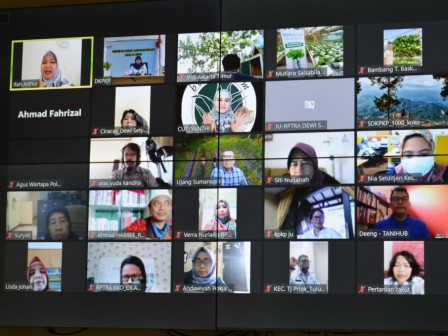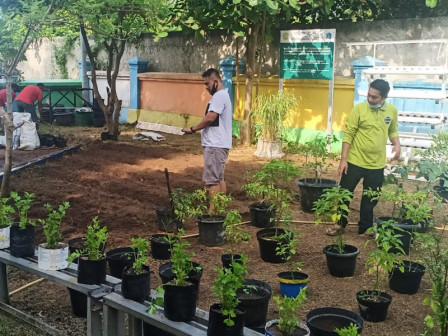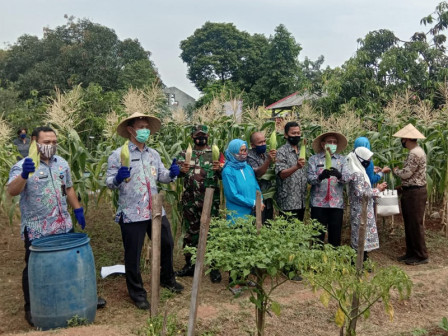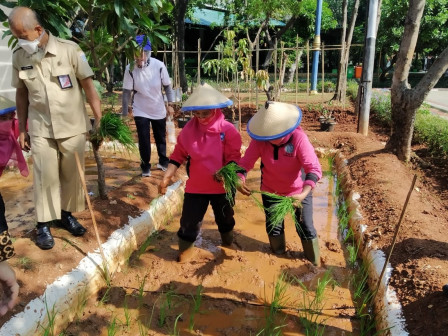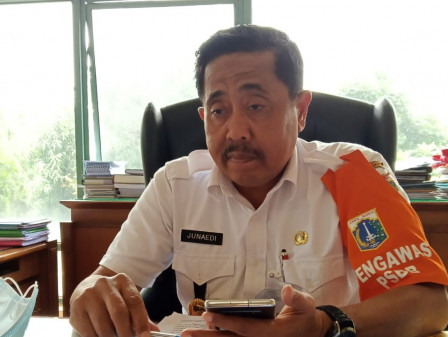Millennial Farmers who Develop Urban Farming in the Limited Land of Jakarta
Reported by Aldi Geri Lumban Tobing | Translated by Maria Inggita
Limited land in Jakarta is not an obstacle for millennial farmers in the capital. Even though they are young, they choose to become farmers not only as a hobby, but also as a promising job or business.
It is a very good webinar where it can bring urban farmers together, especially the millennial generation, to discuss and share information
Related to this topic, Jakarta Maritime, Agriculture, and Food Security (KPKP) Agency held webinar with theme "Talking with Millennial Farmers in Jakarta".
This webinar invited speakers, namely Jakarta Deputy Governor for Population Control and Settlements, Suharti; Jakarta Communication, Information, and Statistics Agency (Diskominfotik) Head, Atika Nur Rahmania; Jakarta KPKP Agency Acting Head (Plt), Suharini Eliawati; Professor/Dean of Human Ecology Faculty of Bogor Institute of Agriculture, Ujang Sumarman.
Urban Farming Becomes Popular in Thousand IslandsNumber of public figures also participated in this webinar, such as Mumahammad Haykal Kamil, Cut Yanthi, and Ignasius Jonan, as well as hundreds of participants from various regions in Indonesia.
One of the issues raised in this discussion was related to blockchain technology in urban farming sector.
This technology is considered potential because it can be used to track urban farming products from the upstream to downstream thus they can control one another with an integrated data.
This technology includes general data regarding farmer's identity and background; geo-tagging data such as area location and its size; urban farming activities; ecology-related data; market-related data; prices and transactions. It can create a competitive marketplace and leverage for multiple e-commerce.
Jakarta Deputy Governor for Population Control and Settlements, Suharti mentioned that currently almost 100 percent of vegetables and fruits supplies are still from outside of Jakarta. Thus it is seen as a challenge and an opportunity.
"It is a big opportunity because the comparative advantage will be great if we can produce it ourselves in Jakarta. Because, don't have to think about transportation cost when we sell it within the city. Moreover, it is more fresh because it produced in Jakarta," she stated, Wednesday (11/4).
She encourages millennial farmers in Jakarta to form an institution or association with legal status that can make it easier for collaboration, not only with Jakarta Government, but also with other parties or stakeholders.
"Jakarta has Large-Scale Social Collaboration (KSBB). If it can enter the platform, we can facilitate them by looking for donors according to the needs of capital, equipment, and training. So these young farmers can have a discussion to find out what their needs thus later we can help them to fulfill it," she conveyed.
According to her, Jakarta Government is open to thoughts or ideas from millennial farmers. Because it is not only to find out the farmer's needs, but also the regulations which needed for urbna farming development in Jakarta.
"They need to be involved in making decisions and policies related to urban farming in Jakarta," she stated.
The increasing number of population in Jakarta leads to increasing needs of food consumption. Thus millenial farmers shouldn't be worried because they have a market and it continues to exist and develop.
"If we can improve product's quality and variety, the market will be closer to us," she added.
Jakarta KPKP Agency Head, Suharini Eliawati mentioned, this webinar was also held to commemorate Youth Pledge Day which falls on October 28.
"We want to continue exploring the potential of millennial farmers in Jakarta to realize food security and greening," she said.
Jakarta Diskominfotik Head, Atika Nur Rahmania said, currently her side is consolidating data related to urban farming that can help millennial farmers to develop agricultural activities in the city.
"We have consolidated data in our database which can be also opened to public to assist urban farmers to start and develop urban farming," she mentioned.
According to her, one of Jakarta Smart City's focuses is on fulfillment of food security. It opens opportunities for agricultural startups to collaborate in developing applications which can improve productivity of millennial farmers. as the main consumer of technology.
"We invite millennial farmers to join Jakarta Smart City ecosystem, especially related to food security. The ideas, needs, and discussion about what we do in the future are aiming for green lifestyle implementation for the city's sustainability. It will be a collective work of community, especially for millenial farmers," she asserted.
One of Jakarta's millennial farmers, Ahmad Fahrizal from Sejahtera Makmur Farmer Group said, he has specifically developed cimpedak avocado tree nursery.
"We have done labeling. For marketing, around 5,000-7,000 seeds have been sold in various regions. We sell it online through social media," he mentioned.
Meanwhile, a public figure who served as Minister of Energy and Mineral Resources (ESDM) for 2016-2019 period, Ignasius Jonan appreciated Jakarta Government for holding talks with millennial farmers.
"It is a very good webinar where it can bring urban farmers together, especially the millennial generation, to discuss and share information," he conveyed.
He motivated millennial farmers for not be ashamed and afraid in making urban farming as a promising business. Because in Japan as an advanced country, he continued, is still striving to have sustainable agriculture by not importing staple foods.
"It is a chance to develop urban farming. Don't be ashamed of being a farmer. Salute to Jakarta Government for holding urban farming webinar with millennial nuances who are happy to participate in this activity," he closed.

